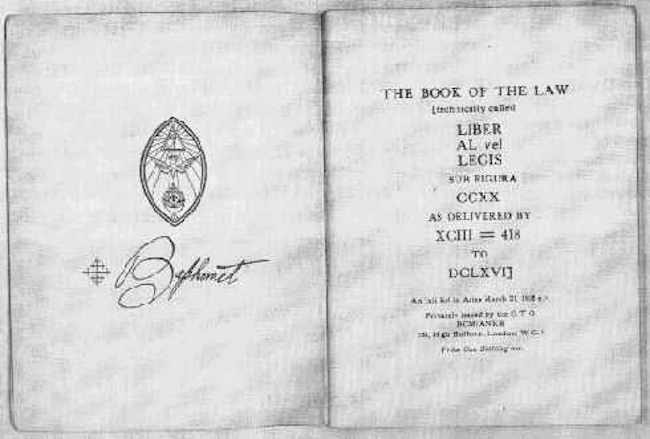If you attend any meeting of Thelemites someone is likely to say “Do what thou wilt shall be the whole of the Law,” which is always answered by “Love is the law, love under will.” What does that mean?
The phrase “Do what thou wilt” is part of the law of Thelema. It comes from the Book of the Law, Chapter I, line 40, dictated to Aleister Crowley by the entity Aiwass.
I can do whatever I want?
To some it has the ring of selfishness – live life for yourself – and there are people who play it out that way. At first glance it doesn’t seem to be terribly spiritual or encourage working with others. What if my will is to steal people’s pensions or sell little girls into slavery? In a world where everyone is living by this Law, what keeps order?
I could say that humans are social animals, actions have effects, breaking secular law has its own consequences, the science of happiness notes we are most fulfilled when giving to others. But all these things, while true, aren’t quite to the point.
Let’s look at it again. The phrase doesn’t say do whatever you “want”, it says “wilt”.
What does “wilt” mean?
It’s a bit of an archaism. “Wilt” is a conjugation of “will” as a verb: I will, thou wilt, you will. We don’t use “thou” much in daily speech these days but it part of the English language.
So what is will? Crowley said “in practice, only one act is lawful for each one of us at any given moment” (Book of the Law, Introduction, III). Our job is to determine what that appropriate act is at every moment.
How do we know what we will?
That’s the “magick” part. Learning the meaning of will, how it manifests, how it directs us, how to recognize the right path and when we’ve fallen away from it, occupies a good bit of early magical training, and stays front and center all our magical lives.
What about other people then?
The Law applies equally for everyone; each person, each creature, has their own will to do. It’s not my business to figure anyone else’s will out for them.
It may be my business to help them do it though. This turned into an indispensable compass for me when dealing with my partner Ted’s aging parents. When they could no longer care for themselves alone we had a lot of decisions to make. When they lost lucidity through drugs or dementia we had primary responsibility for them. I found it a heavy burden to bear and constantly worried about doing well by them. How to decide what was right? How to measure success – the length of their lives, preserving their funds, some sense of their happiness? Then I thought, “let’s help them do their will.” During their moments of lucidity I would just ask them, what do you want? If you don’t want it, we’re not going to do it, and if you do want it, we’ll make sure it happens.
I found that compass to be tremendously comforting. I wasn’t deciding that they should do any particular thing, and it didn’t matter whether I thought it was helpful or foolish, what mattered is that it was what they wanted. Frank died as he had wanted, without heroic measures, and Carol lived in her house alone until she decided to move to assisted living to be closer to us. I still ask her frequently what she wants. At the moment what she wants is to go out to dinner or shop for clothes, and I’m happy to do that with her as long as we can. I have no regrets and I am at peace with the process; I feel clean.
This applies equally to children, pets, any beings over whom adult humans have life and death power. The duty of the guardian is to provide for their well-being – food, shelter, health care, love – while protecting them from hazards they cannot recognize. Look both ways before you cross the street. No kitteh, don’t chew on that electrical cord. But if the kid doesn’t want piano lessons, if the cat insists she will not sit on your lap, if the dog longs to sleep with you, the kid begs to go to ballet school, these are all expressions of their nature.
So for me the Law not only governs what I do, it also guides me in my relationship with others. Doing my will doesn’t mean running roughshod over everyone around me. It actually guides me to being compassionate while respecting everyone around me as sovereign beings. That’s the love part.


